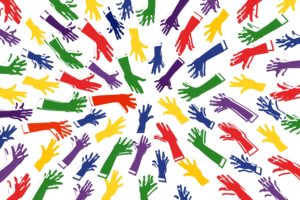One of our favorite topics here at Duncan Lake Speech Therapy is inclusion. If you tuned in to our Facebook page earlier this week, you’ll know that even though we are in quarantine, there are still great opportunities to learn more about inclusion and to teach your kiddos about inclusion. The first step of any inclusive practice is learning, both on the part of parents and caregivers and kiddos. Thus, today, I have provided some resources to get your education party started.
I’m going to roll out the resources in a multi-part series because otherwise this post would be completely overwhelming. This is not, by any means, a completely comprehensive list of resources, nor is it a comprehensive list of disabilities. It’s just a place to get started.
Please feel free to comment with other resources that you have so that we can add to the list in another round of resources at a later date!
What are disabilities?
- In TV, check out Daniel Tiger episode, “Daniel’s New Friend.” Sesame Street features Julia, a child with ASD, regularly. Please click here for videos featuring Julia.
- There are a lot of videos out there that explain disabilities. This great article from WHYY gives a great list of video-based resources to use for kiddos of any age.
- Kids’ Quest is a web-based program through the CDC that helps children learn and explore various disabilities.
- Disability in KidLit is one of my go-to sites. The books feature characters with disabilities. Take a look!
- Understood
- Various advocacy sites offer general information about disability in the USA. Check out the National Disability Rights Network, the Michigan Disability Rights Coalition, and The Arc of Kent County.
ADD/ADHD
- Children and Adults with AD/HD (CHAAD): Provides resources for parents, teachers, and adults with ADD/ADHD.
- Not Broken, Just Different: Explaining ADHD to a Young Child: An article written for parents explaining an ADHD diagnosis to their child.
- Helping Peers to Learn about ADHD: A handout from ADDitude Magazine.
- How to ADHD: Check out this YouTube channel for a very insightful look at ADHD. This is probably best for older kiddos and young adults. Be sure to watch this How to (Explain) ADHD video!
Apraxia
- Apraxia Kids: The go-to place for all things apraxia
- American Speech-Language-Hearing Association (ASHA): Overview of apraxia
Autism Spectrum Disorder
- The Autistic Self Advocacy Network: TONS of resources here. ASAN is run and maintained by individuals with ASD!
- Research Autism: This organization offers a “Kit for Kids” that includes a ton of resources on how to teach kiddos about ASD. It looks like they are all free and available for digital download.
- ASD Awareness: PBS is TV gold. They offer a ton of different resources for teaching kiddos about ASD (as well as have good visibility for individuals with disability in general).
- Teaching Kids About ASD: A great article from Sesame Street!
Cerebral Palsy
- Family Life With Cerebral Palsy: This amazing YouTube channel is a daily vlog of a family with an adult child with Cerebral Palsy. There is a lot to sort through here, but this video explains “Why Does Michah Have CP?”
- Explaining CP to Children: This is a great article written by CerebralPalsy.org.
- CP Fact Pack: This teaching resource was put together by the Cerebral Palsy Alliance. It’s meant for teachers, but the information is great and it helps one to teach children about CP.
Down Syndrome
- Down Syndrome Association of West Michigan: We are so fortunate to have such a wonderful resource right here in West Michigan. DSAWM provides tons of resources for individuals with Down Syndrome, their families, and people who want to know more about Down Syndrome.
- National Down Syndrome Society: This group has a lot of resources as well! Check out the “About Down Syndrome” tab to learn more about Down Syndrome.
- Speaking to Your Child’s Classmates about Down Syndrome: While this isn’t necessarily what you may be doing, it is an excellent resource for how to explain Down Syndrome to your children.
- Just Like You: This video resource is great for teaching kids about Down Syndrome.
We’ll continue to bring you resources as we go along! If you have any questions, be sure to ask your friendly, neighborhood speech-language pathologist. They will be very willing to help you.


Recent Comments